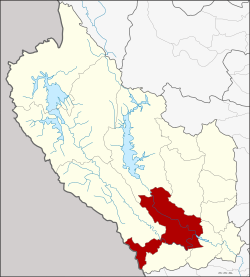Mueang Kanchanaburi (Thai: เมืองกาญจนบุรี, pronounced [mɯ̄a̯ŋ kāːn.t͡ɕā.ná(ʔ).bū.rīː]) is the capital district (amphoe mueang) of Kanchanaburi province, central Thailand.
Mueang Kanchanaburi
เมืองกาญจนบุรี | |
|---|---|
 | |
 District location in Kanchanaburi province | |
| Coordinates: 14°0′12″N 99°33′0″E / 14.00333°N 99.55000°E | |
| Country | Thailand |
| Province | Kanchanaburi |
| Seat | Pak Phraek |
| Area | |
• Total | 1,236.28 km2 (477.33 sq mi) |
| Population | |
• Total | 122,875 |
| • Density | 99/km2 (260/sq mi) |
| Time zone | UTC+7 (ICT) |
| Postal code | 71000 |
| Geocode | 7101 |
History
editMueang Kanchanaburi changed status to become the capital district (amphoe mueang) of Kanchanaburi Province in 1913. The old district office was in Tambon Ban Nuea. It was moved to Tambon Pak Phraek on 1 October 1954.
The district is home to the "bridge over the River Kwai", part of World War II's Death Railway.
Geography
editNeighboring are (from west clockwise) Tanintharyi Division of Myanmar, Sai Yok, Si Sawat, Bo Phloi, Tha Muang, and Dan Makham Tia of Kanchanaburi Province and Suan Phueng of Ratchaburi province.
The Khwae Noi and Khwae Yai Rivers are important water resources which join at the town Kanchanaburi to form the Mae Klong River.
Phu Nam Ron[3] is a transnational cross-border point at the western end of the district. It is expected to gain in importance if the planned Dawei deepwater port project goes ahead, along with a highway and a railway line between Bangkok and that harbor.[4]
Administration
editThe district is divided into 13 sub-districts (tambons), which are further subdivided into 99 villages (mubans). The town (thesaban mueang) Kanchanaburi covers tambons Ban Nuea, Ban Tai, and parts of Pak Phraek, Tha Makham, and also parts of tambon Tha Lo of neighboring Tha Muang district. Additionally there are three townships (thesaban tambons): Kaeng Sian, Nong Bua, and Talat Ya each covering parts of the same-named tambons, and 11 tambon administrative organizations (TAO).
| No. | Name | Thai name | Villages | Pop.[1] | |
|---|---|---|---|---|---|
| 1. | Ban Nuea | บ้านเหนือ | - | 10,464[2] | |
| 2. | Ban Tai | บ้านใต้ | - | 6,384[2] | |
| 3. | Pak Phraek | ปากแพรก | 13 | 7,169[2] | |
| 4. | Tha Makham | ท่ามะขาม | 5 | 10,929 | |
| 5. | Kaeng Sian | แก่งเสี้ยน | 9 | 5,944 | |
| 6. | Nong Bua | หนองบัว | 8 | 6,102 | |
| 7. | Lat Ya | ลาดหญ้า | 7 | 23,580 | |
| 8. | Wang Dong | วังด้ง | 11 | 8,679 | |
| 9. | Chong Sadao | ช่องสะเดา | 7 | 3,911 | |
| 10. | Nong Ya | หนองหญ้า | 9 | 7,813 | |
| 11. | Ko Samrong | เกาะสำโรง | 8 | 10,000 | |
| 13. | Ban Kao | บ้านเก่า | 15 | 16,147 | |
| 16. | Wang Yen | วังเย็น | 7 | 5,753 |
Missing numbers belong to tambon which now form Dan Makham Tia
References
edit- ^ a b "รายงานสถิติจำนวนประชากรและบ้านประจำปี พ.ศ.2560". Department of Provincial Administration (in Thai). 30 January 2022.
- ^ a b c d "รายงานสถิติจำนวนประชากรและบ้านประจำปี พ.ศ.2560". Department of Provincial Administration (in Thai). 30 January 2022.
- ^ Phu Nam Ron Border Crossing
- ^ "Table A1-1-1a. Prospective projects in Mekong sub-region" (PDF). Archived from the original (PDF) on 2013-05-04. Retrieved 2016-05-13.